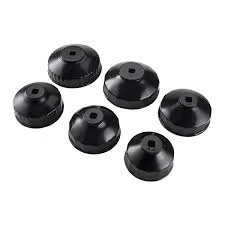Mobile:+86-311-808-126-83
Email:info@ydcastings.com
Understanding the Functionality and Design of Compressor Impellers in Modern Engineering
Understanding Compressor Impellers Key Components of Turbo Machinery
In the world of turbo machinery, compressor impellers play a critical role in ensuring efficient operation and optimal performance. These components are vital in various applications, ranging from aircraft engines to industrial gas turbines and even refrigeration systems. This article delves into the significance, design, and operational principles of compressor impellers, shedding light on their importance in modern engineering.
What is a Compressor Impeller?
A compressor impeller is a rotating part of a centrifugal compressor, designed to increase the pressure of a gas. It consists of a series of blades that are strategically positioned to impart kinetic energy to the air or gas being drawn in. As the impeller spins, it accelerates the gas outward and converts that kinetic energy into potential energy in the form of increased pressure.
The Design of Compressor Impellers
The design of an impeller is crucial for its efficiency and effectiveness. An impeller typically consists of a hub and a series of blades; the configuration and shape of these blades significantly influence the compressor's performance. Key design factors include blade thickness, angle, and curvature, each carefully optimized to minimize losses and maximize airflow. Advanced computational fluid dynamics (CFD) tools are often employed in the design process to simulate airflow and refine blade geometry.
Materials used in manufacturing compressor impellers are typically chosen for their strength and ability to withstand high temperatures and pressures. Common materials include aluminum alloys, titanium, and specialized composites, ensuring that the impeller can perform reliably over extended periods.
Operational Principles
Centrifugal compressors utilize the principle of centrifugal force to increase gas pressure. When the compressor operates, the impeller draws the gas into its eye (the center). As the impeller rotates, the blades force the gas radially outward. The speed of the rotation is essential; higher rotational speeds yield greater energy transfer, resulting in increased pressure. Following the impeller, the gas enters a diffuser, where its velocity decreases while pressure continues to rise, preparing the gas for the next stage of compression or storage.
compressor impeller

The efficiency of a compressor impeller is vital for the overall efficiency of the system it serves
. A well-designed impeller can significantly reduce energy consumption and operational costs while improving the performance of engines and other equipment.Applications of Compressor Impellers
Compressor impellers are utilized across a broad spectrum of industries. In aviation, they are crucial components in jet engines, where they compress air before it enters the combustion chamber. In the power generation sector, gas turbines rely on compressor impellers to regulate airflow efficiently, enhancing power output and stability.
Moreover, in the HVAC industry, centrifugal compressors leverage impellers to circulate refrigerants effectively, thereby improving cooling performance in residential and industrial applications. The versatility of compressor impellers makes them essential in technologies that power modern life.
Future Trends in Impeller Technology
With advancements in materials science and computational modeling, the future of compressor impellers looks promising. Innovations such as additive manufacturing (3D printing) allow for the creation of complex geometries that were previously impossible, leading to lighter and more efficient impellers. Additionally, ongoing research into aerodynamic optimizations and noise reduction techniques aims to enhance performance while minimizing environmental impacts.
Conclusion
In summary, compressor impellers are vital components of turbo machinery, influencing efficiency and performance across various applications. Their intricate designs and operational principles underscore the importance of innovation in engineering. As technologies continue to evolve, so too will the capabilities of compressor impellers, paving the way for more efficient and sustainable solutions in the future. Understanding the role and functionality of these components is essential for engineers and industry professionals alike, as they navigate the complexities of modern machinery.
-
Understanding Metal Casting TechniquesNewsApr.02,2025
-
Understanding Exhaust Manifolds for Enhanced Engine PerformanceNewsApr.02,2025
-
The World of Metal FabricationNewsApr.02,2025
-
Key Components for Pump and Turbo EfficiencyNewsApr.02,2025
-
Essential Tools for Automotive Maintenance and RepairNewsApr.02,2025
-
Durable Valve Components for Effective Water ManagementNewsApr.02,2025











